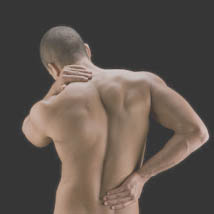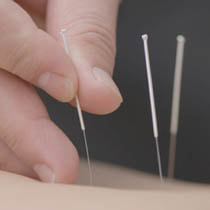Kelowna Acupuncture - Experienced Acupuncturists Trained in China and Taiwan
Acupuncture vs PainAcupuncture is a popular therapy for the treatment of pain, sports injuries, fibromyalgia, and arthritis. Techniques our acupuncturists use have been learned from some of the top Chinese medicine doctors in China and Taiwan.
|
Internal MedicineAcupuncture and TCM diagnostic methods such as tongue and pulse diagnosis which reveal underlying imbalances and help our acupuncturists identify, treat, and prevent health problems before they become symptomatic.
|
Emotional HealthAcupuncturist with master's level training in at Nanjing University of Traditional Chinese Medicine in a system of acupuncture showing a high degree of efficacy in treatment of depression, anxiety, PTSD and other emotional conditions
|
Women's HealthOur acupuncturists have advanced training in acupuncture and Chinese herbal medicine at China’s top Chinese medicine university for women's health and fertility. Studies have shown an increase in fertility success by 70%.
|
徐 而 疾 則 實 疾 而 徐 則 虛, 言 實 與 虛, 若 有 若 無, 察 後 與 先, 若 存 若 亡。 為 虛 與 實, 若 得 若 失。

At Balance Point Acupuncture, our primary objective is to collaborate intimately with every patient to discover the underlying cause of one's discomfort or pain. As per the principles of traditional Chinese medicine, acupuncture and herbal therapies function by promoting circulation and initiating the body's innate healing mechanisms. By integrating acupuncture, herbs, and lifestyle modifications, we can establish a comprehensive healthcare strategy tailored to your specific needs and goals, with a particular emphasis on the use of acupuncture.
What is Acupuncture?
Acupuncture and Chinese medicine are highly versatile and comprehensive healing arts that can effectively address a broad spectrum of conditions by promoting the circulation of Qi, or energy, throughout the body. As per the principles of Traditional Chinese Medicine (TCM), proper Qi circulation is essential to maintaining balanced blood flow and regulating the nervous and endocrine systems. Our experienced acupuncturists utilize the principles of acupuncture and Chinese medicine to provide accurate diagnoses and personalized treatment plans, whether you are recovering from an injury, managing a medical ailment, or simply seeking to maintain a healthy system. Patients who visit our clinic report experiencing symptom relief, reduced stress, and increased energy as a result of our effective acupuncture and Chinese medicine treatments.
What is Traditional Chinese Medicine ?
Traditional Chinese Medicine (TCM) is a comprehensive system of healing and wellness that has been practiced for thousands of years in China and other parts of the world. TCM emphasizes the interconnection between the body, mind, and environment, and uses a variety of techniques to promote overall health and wellbeing. The fundamental principles of TCM include the concept of Qi, or vital energy, and the interdependence of Yin and Yang, two complementary and opposing forces that exist in all aspects of life. TCM encompasses a wide range of practices, including acupuncture, herbal medicine, massage, dietary therapy, and exercise such as Tai Chi and Qigong. TCM is founded on the belief that the body has a natural ability to heal itself, and that it is the practitioner's role to support and enhance this innate healing power. Through its holistic approach, traditional Chinese medicine aims to treat not just symptoms but the underlying causes of illness and disease, promoting optimal health and balance in the body and mind.
How Does Acupuncture Work?
The body is an intricate and interconnected system of blood vessels, nerves, muscles, ligaments, and tendons, all in a constant state of dynamic equilibrium. Blood vessels expand and contract to transport blood to where it is needed, such as during a jog when the arteries dilate in the legs, lungs, and heart to meet the demand for oxygen and blood. Acupuncture can help regulate blood flow and promote optimal circulation throughout the body. On cold days, the body may constrict blood vessels in the skin and limbs, and redirect blood to the organs to conserve heat, while on warm days, arteries expand and move closer to the surface to dissipate heat. Acupuncture can also help regulate the body's response to temperature changes. Muscles play a critical role in maintaining good posture and joint stability. Acupuncture can help alleviate muscle tension and promote relaxation, ensuring that the muscles function optimally. Nerves play a vital role in coordinating and transmitting signals between the brain and the various systems and organs of the body. Acupuncture can help regulate and support the functioning of the nervous system, promoting overall health and wellbeing.
But what if the body’s ability to regulate and balance itself is lost? If the signals get scrambled do to stress, sports injuries, overwork, side effects from medications, toxins, etc. the balance is lost resulting in various health conditions.
At the core of pain and disease lies the loss of the body's natural ability to regulate and balance itself, according to the principles of Chinese medicine. For over 5000 years, Chinese medicine practitioners have been studying and mapping the acupuncture meridian system, which serves as a guide to how the body communicates with itself and the rest of the body. Acupuncture is a key component of Chinese medicine, and works by stimulating specific points on the body to restore balance and correct the flow of Qi, or energy. Through acupuncture, signals from the brain to the affected area are reset, resulting in balanced tissue function, pain relief, and the elimination of other symptoms. Acupuncture is a safe, natural, and effective form of treatment that can help restore the body's natural balance and promote overall health and wellbeing.
What is Acupuncture?
Acupuncture and Chinese medicine are highly versatile and comprehensive healing arts that can effectively address a broad spectrum of conditions by promoting the circulation of Qi, or energy, throughout the body. As per the principles of Traditional Chinese Medicine (TCM), proper Qi circulation is essential to maintaining balanced blood flow and regulating the nervous and endocrine systems. Our experienced acupuncturists utilize the principles of acupuncture and Chinese medicine to provide accurate diagnoses and personalized treatment plans, whether you are recovering from an injury, managing a medical ailment, or simply seeking to maintain a healthy system. Patients who visit our clinic report experiencing symptom relief, reduced stress, and increased energy as a result of our effective acupuncture and Chinese medicine treatments.
What is Traditional Chinese Medicine ?
Traditional Chinese Medicine (TCM) is a comprehensive system of healing and wellness that has been practiced for thousands of years in China and other parts of the world. TCM emphasizes the interconnection between the body, mind, and environment, and uses a variety of techniques to promote overall health and wellbeing. The fundamental principles of TCM include the concept of Qi, or vital energy, and the interdependence of Yin and Yang, two complementary and opposing forces that exist in all aspects of life. TCM encompasses a wide range of practices, including acupuncture, herbal medicine, massage, dietary therapy, and exercise such as Tai Chi and Qigong. TCM is founded on the belief that the body has a natural ability to heal itself, and that it is the practitioner's role to support and enhance this innate healing power. Through its holistic approach, traditional Chinese medicine aims to treat not just symptoms but the underlying causes of illness and disease, promoting optimal health and balance in the body and mind.
How Does Acupuncture Work?
The body is an intricate and interconnected system of blood vessels, nerves, muscles, ligaments, and tendons, all in a constant state of dynamic equilibrium. Blood vessels expand and contract to transport blood to where it is needed, such as during a jog when the arteries dilate in the legs, lungs, and heart to meet the demand for oxygen and blood. Acupuncture can help regulate blood flow and promote optimal circulation throughout the body. On cold days, the body may constrict blood vessels in the skin and limbs, and redirect blood to the organs to conserve heat, while on warm days, arteries expand and move closer to the surface to dissipate heat. Acupuncture can also help regulate the body's response to temperature changes. Muscles play a critical role in maintaining good posture and joint stability. Acupuncture can help alleviate muscle tension and promote relaxation, ensuring that the muscles function optimally. Nerves play a vital role in coordinating and transmitting signals between the brain and the various systems and organs of the body. Acupuncture can help regulate and support the functioning of the nervous system, promoting overall health and wellbeing.
But what if the body’s ability to regulate and balance itself is lost? If the signals get scrambled do to stress, sports injuries, overwork, side effects from medications, toxins, etc. the balance is lost resulting in various health conditions.
- Blood vessels become locked in a constricted state, restricting blood flow and starving tissues and allowing waste to accumulate.
- Muscles become too tense pulling, torquing, jamming and twisting joints and vertebrae, and bones out of position, straining ligaments and tendons resulting in chronic inflammation and pain.
- Nerve impulses are blocked or scattered resulting in an unclear or weak signal which leading to tissue and organ malfunction.
At the core of pain and disease lies the loss of the body's natural ability to regulate and balance itself, according to the principles of Chinese medicine. For over 5000 years, Chinese medicine practitioners have been studying and mapping the acupuncture meridian system, which serves as a guide to how the body communicates with itself and the rest of the body. Acupuncture is a key component of Chinese medicine, and works by stimulating specific points on the body to restore balance and correct the flow of Qi, or energy. Through acupuncture, signals from the brain to the affected area are reset, resulting in balanced tissue function, pain relief, and the elimination of other symptoms. Acupuncture is a safe, natural, and effective form of treatment that can help restore the body's natural balance and promote overall health and wellbeing.
Frequently Asked Questions
What Does Acupuncture Feel Like?
While many individuals may associate needles with painful injections or blood draws, acupuncture needles are much finer and typically cause little to no discomfort upon insertion. Acupuncture is an important aspect of traditional Chinese medicine, and involves the use of fine needles that are inserted into specific points on the body to promote healing and balance. Although patients may initially experience a slight pinch or heavy sensation, the needles are designed to be as painless as possible. Once the acupuncture needles are inserted to the proper depth, patients often report feeling minimal to no sensation at all. Acupuncture is a safe and natural form of treatment that has been used for centuries to alleviate pain, promote healing, and improve overall health and wellbeing.
What Can I Expect from my First Visit?
In addition to inquiring about the condition that led you to the clinic, practitioners of acupuncture and Chinese medicine may ask for a broader health history. Aspects such as digestion, sleep quality, and stress levels are all important components of overall health. At Balance Point, Chinese pulse diagnosis is utilized as an ancient art to aid in diagnosis. This technique involves feeling the pulse of the artery at both wrists to gather additional information about a patient's condition. Our practitioners, Vivi and Travis, have sought out training from renowned teachers in the use of pulse diagnosis. Through this technique, a wide range of conditions can be identified, including digestive complaints such as gastritis and constipation, musculoskeletal pain and tension, organ deficiencies, pathologies of heart valves, liver function, and many others. Acupuncture and Chinese medicine offer a holistic approach to healing, taking into account the interconnectedness of all aspects of a patient's health.
For more information on acupuncture click here!
What Does Acupuncture Feel Like?
While many individuals may associate needles with painful injections or blood draws, acupuncture needles are much finer and typically cause little to no discomfort upon insertion. Acupuncture is an important aspect of traditional Chinese medicine, and involves the use of fine needles that are inserted into specific points on the body to promote healing and balance. Although patients may initially experience a slight pinch or heavy sensation, the needles are designed to be as painless as possible. Once the acupuncture needles are inserted to the proper depth, patients often report feeling minimal to no sensation at all. Acupuncture is a safe and natural form of treatment that has been used for centuries to alleviate pain, promote healing, and improve overall health and wellbeing.
What Can I Expect from my First Visit?
In addition to inquiring about the condition that led you to the clinic, practitioners of acupuncture and Chinese medicine may ask for a broader health history. Aspects such as digestion, sleep quality, and stress levels are all important components of overall health. At Balance Point, Chinese pulse diagnosis is utilized as an ancient art to aid in diagnosis. This technique involves feeling the pulse of the artery at both wrists to gather additional information about a patient's condition. Our practitioners, Vivi and Travis, have sought out training from renowned teachers in the use of pulse diagnosis. Through this technique, a wide range of conditions can be identified, including digestive complaints such as gastritis and constipation, musculoskeletal pain and tension, organ deficiencies, pathologies of heart valves, liver function, and many others. Acupuncture and Chinese medicine offer a holistic approach to healing, taking into account the interconnectedness of all aspects of a patient's health.
For more information on acupuncture click here!
What Does Acupuncture Actually Do?
Acupuncture is a traditional Chinese medicine practice that involves inserting thin needles into specific points on the body. While the exact mechanisms of how acupuncture works are not fully understood, it is believed to help regulate the flow of energy, or qi, in the body. This can help to alleviate a wide range of health issues, from chronic pain and stress to digestive problems and insomnia. Research suggests that acupuncture may help stimulate the release of endorphins, the body's natural painkillers, and reduce inflammation. Overall, acupuncture aims to restore balance and promote overall wellbeing in the body. Whether you're a believer in traditional Chinese medicine or simply looking for alternative ways to manage your health, acupuncture may be worth a try.
How Long Does it Take for Acupuncture to Work for Pain?
Many people wonder how long it takes for acupuncture to work for pain relief. The truth is, there is no one-size-fits-all answer. Some individuals experience immediate relief after just one session, while others may require multiple sessions to feel the full effects. It all depends on the individual's condition, the severity of their pain, and how their body responds to the treatment. It's important to have realistic expectations and be patient when undergoing acupuncture therapy for pain management. Trust the process and give it time to work its magic.
What are the Long Term Benefits of Acupuncture?
Acupuncture is an ancient practice that has been shown to provide a range of long-term benefits for those who regularly undergo treatments. From reducing chronic pain to improving mental health and overall well-being, acupuncture has been found to be a valuable tool in promoting long-term wellness. By targeting specific energy points within the body, acupuncture can help to alleviate a variety of ailments and promote balance within the body. Not only can it provide relief from current symptoms, but regular acupuncture sessions can also help to prevent future health issues from arising. The holistic approach of acupuncture considers the individual as a whole, addressing both physical and emotional needs, making it a valuable long-term investment in one's health.






